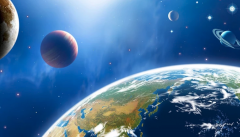
Science Journalism
Space conquest: an essential step for survival ?

Have you ever dreamt of going into space? Since the XXth century, space conquest is one of the main sources of scientific progress of all times. However, in what ways does space exploration change our lives?
Nowadays, almost everyone has a cell-phone: you are probably even reading this article on yours. Did you know that your camera, the GPS, and even the changes in the position of the screen that is done by your phone every time you move it, was created thanks to Space exploration? Indeed, in the 1990s, a team at the Jet Propulsion Laboratory (JPL) worked to create cameras small enough to fit on spacecraft and with scientific quality (now, 1/3 of all cameras contains this technology). Moreover, the GPS (or Global Positioning System) is made possible thanks to the different satellites orbiting around Earth. Those satellites are placed here thanks to space conquest obviously. Now, about the micro accelerometer (that changes the position of your phone’s screen), imagine that each time you watch a video, you couldn’t see it with full screen… Annoying isn’t it?
Do you still believe that space conquest doesn’t improve our daily life? Now if you don’t, try to imagine your life without any phone, any microwave oven, LED, … Try to drive your baby, without an airbag, to a nursery that doesn’t have any smoke detector and then change his diaper (which is not a disposable one) and wash it again and again. Then feed him with food that wasn’t submitted to proper quality control. Besides, sterilization of air (used in airplanes to keep a “fresh air”), the security blanket, the pumps used for artificial hearts were also all created and commercialized thanks to space conquest. Imagine all the wonders that might be created in the future thanks to space exploration!
In addition to facilitating our everyday life, Space conquest is also essential to the survival of the Human species. Stephen Hawking said in 2001: “I don’t think the human race will survive the next thousand years unless we spread into Space. There are too many accidents that can befall life on a single planet, but I am an optimistic, we will reach out to the stars”. Indeed, Humanity must endure challenges that become harder and harder to face. Today, one of the main threats for Humanity is global warming. Even if space exploration contributed to face this issue with the invention of solar panels, this is not enough. With a too important worldwide population and a planet that is dying, Mankind has to seek for a new home. Therefore, space exploration appears to be the unique solution in order to create extra-terrestrial colonies and to preserve our species. After, the Moon, Mars is the new objective (The scientist world agrees to say that this goal will be reached in less than 20 years). The discovery of other planets, called exoplanets, and of planets that are quite similar to the Earth, makes the dream possible… In a dying planet, with a population that keeps growing, colonies seem to be the future of our civilization. (For more information about space colonization, please read our article called: “From Sci-Fi to Reality”).

Furthermore, exploration is deeply rooted in Human’s genes. Think about the Spanish Empire, considered to be one of the greatest civilizations of all times thanks to the discovery of “the New World”. Great progress was always created owing to great discoveries. Think about the invention of the wheel, of the boat, and, with a world that needs to move faster and faster, of the internet! Space exploration is just another step to discover new worlds, but mostly, to survive.
Besides, space exploration helps us understand the universe better. Solar eruptions or solar flares described as bursts of intense radiation emanating from the sun, that occurs with different intensities, can reach our planet. Thus, those solar flares might have an impact on our daily routine and must be understood and studied by scientists. Indeed, even if we cannot feel the heat coming from those solar flares thanks to our atmosphere, electromagnetic and energetic particles can create disruptions with signal transmissions, which can then throw off GPS satellites. Hence, if you have noticed that your GPS is a little bit lost, the solar flares could be to blame. Solar flares could then have a great impact because, as we know that every airline pilot and spacecraft operators rely on GPS satellites to safely fly, and that accurate time synchronization from satellites is imperative for financial networks to govern transactions, imagine what can happen if an intense unplanned solar flare reached our planet… Solar flares are not the only threat coming from space that has to be prevented. The study of the universe, permitted by space exploration, allows us to predict asteroids and meteorites trajectories. Those studies of our universe are useful because owing to them, we can now warn and prevent the population from a terrible disaster.
However, discovering our universe is not the only thing that can help populations. Indeed, satellites help us for meteorology. Prevent the population from natural disaster are now easier, even if it is not always enough…
Therefore, space conquest appears to be essential for our survival: how could we live without it? Even if NASA does not receive as much money as it generates, and that space exploration isn’t as popular as it was in the 70s, space conquest still makes us dream. Indeed, after the first landing on the moon in 1969, a lot of children wanted to become astronauts, scientists or engineers. Space conquest inspires people: it makes us want to change things and to dream about the other future. In fact, 71% of US citizens agreed that “space program is a good investment”. Space conquest isn’t over: space exploration may even be the only thing that will prevent Humanity from complete destruction.

